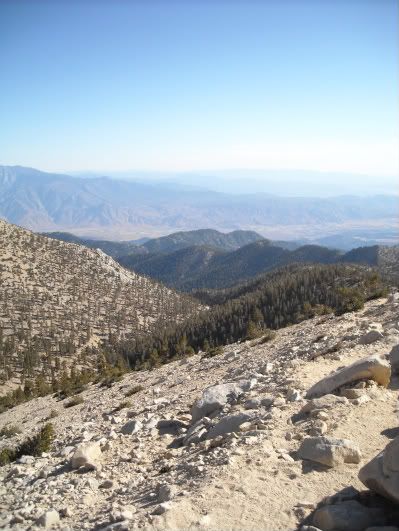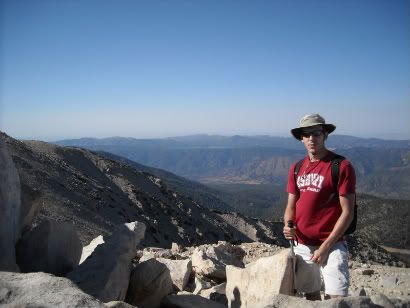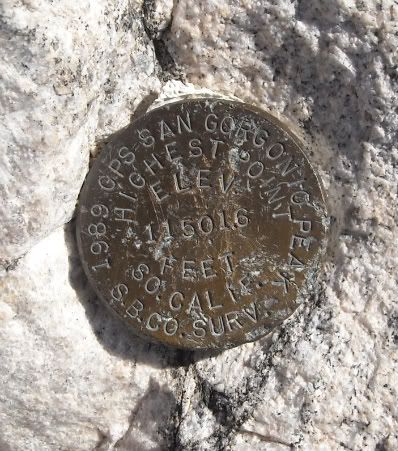



Unresting, unhasting, and silent as light,Nor wanting, nor wasting, Thou rulest in might;Thy justice, like mountains, high soaring aboveThy clouds, which are fountains of goodness and love.-Walter C. Smith




Unresting, unhasting, and silent as light,Nor wanting, nor wasting, Thou rulest in might;Thy justice, like mountains, high soaring aboveThy clouds, which are fountains of goodness and love.-Walter C. Smith
Sir, I understand that you are called an Arminian; and I have been sometimes called a Calvinist; and therefore I suppose we are to draw daggers. But before I consent to begin the combat, with your permission I will ask you a few questions. Pray, Sir, do you feel yourself a depraved creature, so depraved that you would never have thought of turning to God, if God had not first put it into your heart?
Yes, I do indeed.
And do you utterly despair of recommending yourself to God by anything you can do; and look for salvation solely through the blood and righteousness of Christ?
Yes, solely through Christ.
But, Sir, supposing you were at first saved by Christ, are you not somehow or other to save yourself afterwards by your own works?
No, I must be saved by Christ from first to last.
Allowing, then, that you were first turned by the grace of God, are you not in some way or other to keep yourself by your own power?
No.
What then, are you to be upheld every hour and every moment by God, as much as an infant in its mother’s arms?
Yes, altogether.
And is all your hope in the grace and mercy of God to preserve you unto His heavenly kingdom?
Yes, I have no hope but in Him.
Then, Sir, with your leave I will put up my dagger again; for this is all my Calvinism; this is my election my justification by faith, my final perseverance: it is in substance all that I hold, and as I hold it; and therefore, if you please, instead of searching out terms and phrases to be a ground of contention between us, we will cordially unite in those things where in we agree.
H/T: John Piper
Did some unknown creative genius take an ordinary man, Jesus, and invent His deeds of power and His words of love and authority and authenticity, then present this invented Jesus to a church with such deceptive power that many people were willing from the outset to die for this fictional Christ? Further, must we believe that all the Gospel writers swallowed the invention - and in the space of several decades while many who knew the real Jesus were still living? Is that a more reasonable or well-founded guess than the plain assertion that a real man, Jesus Christ, did in fact say and do the sorts of things the biblical witnesses said He did?You must decide for yourself. To my mind, an unknown inventor of this Jesus is more incredible than the possibility of Jesus' reality. So for me the question becomes: "How do we account for a man who leaves a legacy like this?"I cannot morally reckon Him among the poor deluded souls who suffer from pathological delusions of grandeur. Nor can I reckon Him among the great con men of history, a deceiver who planned and orchestrated a worldwide movement of mission on the basis of a hoax. Instead, I am constrained to acknowledge His truth. Both my mind and my heart find themselves drawn to yield allegiance to this man. He has won my confidence.
- In His controversy with the Pharisees concerning their interpretation of the Old Testament, He contrasted the tradition of the elders and the commandment of God found in Scripture. "You have a fine way of rejecting the commandment of God in order to establish your tradition!" (Mark 7:9).- When He answered the Pharisees concerning the problem of divorce, He referred to Genesis 2:24 as something "said" by God, though these are words of the biblical narrator and not a direct quote of God: "He who created them from the beginning made them male and female, and said, 'Therefore a man shall leave his father his mother'" (Matt. 19:4-5).- He makes an explicit statement concerning infallibility in John 10:35: "Scripture cannot be broken."- Repeatedly Jesus treats the Old Testament as an authority that must be fulfilled. "Do not think that I have come to abolish them but to fulfill them. For truly, I say to you, until heaven and earth pass away, not an iota, not a dot, will pass from the Law until all is accomplished" (Matthew 5:17-18; cf. Matthew 26:54, 56; Luke 16:17).- Jesus Himself used the Old Testament as authoritative weapon against the temptations of Satan: "But he answered, 'It is written...'" (Matthew 4:4, 7, 10).The diversity of this witness and its spread over all the Gospel material show that the Lord Jesus regarded the Old Testament as a trustworthy, authoritative, unerring guide in our quest for enduring happiness. Therefore, we who submit to the authority of Christ will also want to submit to the authority of the book He esteemed so highly.
A fool is he who puts his trust in men or created things. Do not be ashamed to serve others for the love of Jesus Christ and to be reckoned as a poor man in this world.Do not rely on yourself, but place your trust in God. Do whatever lies in your power and God will assist your good intentions. Trust neither in your own knowledge nor in the cleverness of any human being; rather, trust in God's grace, for it is He who supports the humble and humbles the overconfident.Glory neither in wealth, if you have any, nor in friends, of they are powerful, but boast in God, the giver of all good things, who desires, above all, to bestow Himself on you.Do not boast about your good looks nor your body's strength, which a slight illness can mar and disfigure. Do not take pride in your skills and talents lest you offend God, to whom you owe these very gifts and endowments.Do not esteem yourself as someone better than others lest, perhaps, you be accounted for worse in the eyes of God, who knows what is in men's hearts. Take no pride in your good accomplishments for God judges differently than men and it often happens that what is pleasing to men is actually displeasing to God.If you see anything good in yourself, believe still better things of others and you will, then, preserve humility. It will do you no harm if you account yourself as worst of all; but it will very much harm you to think that you are better than everyone else. Peace dwells in a humble heart, while in the heart of a proud man there is envy and resentment.-Thomas à Kempis (1380-1471) from The Imitation of Christ
The goodness, friendliness, and loveliness, which are in Jesus, are inexhaustible riches, of which there is no end. If one were to portray the world, with all its glories, in the best manner possible, and even invent something to add to it, yet the discourse would not be a very long one; for there is really not much to be found in the world. He that has looked over the whole, must say, there is nothing to be found in it. But it us very different with our Jesus Immanuel. Ah, were we to speak of his goodness and blessedness, of his love, and the blessings which we may have in him, from one day to another, nay, through whole eternities, we should never arrive at the end of it; and when we had spoken of them a thousand years, we should say, we had not even touched upon them.
-Gerhard Tersteegen (1697-1769), from Spiritual Crumbs from the Master's Table
I found the result to be interesting. In the beginning of the second stanza in Hedge's English we have one of my favorite lines, "Did we in our own strength confide, Our striving would be losing." This line conveys the great truth which was once again revealed as central to the gospel during the Reformation, that no good work from us is efficacious in gaining for ourselves salvation. But I think this truth is even more blatantly stated in Luther's original which says, "Mit unsrer Macht ist nichts getan, Wir sind gar bald verloren," which I translated as, "With our power nothing is done, We are soon completely defeated." Also in the second stanza I liked a line that we miss in the English version which says, "Und ist kein andrer Gott," which literally is translated, "And is no other God." And the last line of the second stanza has a more specific military connotation than in Hedge's English version. In the German this line is, "Das Feld muss er behalten," which I translated as, "The field He must hold," while in the popular English we have "and he must win the battle."
The fourth stanza was also interesting to translate and I think Luther's original better conveys his situation during the Reformation when his brothers were being burned at the stake for standing for the pure gospel freed of the innovations of Rome. In Hedge's English we have, "Let goods and kindred go, This mortal life also, The body they may kill: God's truth abideth still, His Kingdom is forever." In Luther's original we find,
"Nehmen sie den Leib,
Gut, Ehr’, Kind und Weib:
Lass fahren dahin,
Sie haben’s kein’n Gewinn,
Das Reich muss uns doch bleiben."
Which I translated as "They take the body, Property, honors, child and wife: Let them go away, they have no profit, the Kingdom remains ours."
I think Hedge did a masterful job at translating this hymn. For the most part he stayed very close to Luther's original meanings and succeeded in writing a hymn that is musically and poetically pleasing. Below you'll find Luther's original german and my attempt at a translation along with Hedge's translation. If anyone with any skill in German and English reads this I'll appreciate corrections to my attempt in the comments.
Ein Feste Burg (Luther’s original):
Ein’ feste Burg ist unser Gott,
Ein gute Wehr und Waffen;
Er hilft uns frei aus aller Not,
Die uns jetzt hat betroffen.
Der alt’ böse Feind,
Mit Ernst er’s jetzt meint,
Gross’ Macht und viel List
Sein’ grausam’ Ruestung ist,
Auf Erd’ ist nicht seingleichen.
Mit unsrer Macht is nichts getan,
Wir sind gar bald verloren;
Es steit’t für uns der rechte Mann,
Den Gott hat selbst erkoren.
Fragst du, wer der ist?
Er heisst Jesu Christ,
Der Herr Zebaoth,
Und ist kein andrer Gott,
Das Feld muss er behalten.
Und wenn die Welt voll Teufel wär’
Und wollt’ uns gar verschlingen,
So fürchten wir uns nicht so sehr,
Es soll uns doch gelingen.
Der Fürst dieser Welt,
Wie sau’r er sich stellt,
Tut er uns doch nicht,
Das macht, er ist gericht’t,
Ein Wörtlein kann ihn fällen.
Das Wort sie sollen lassen stahn
Und kein’n Dank dazu haben;
Er ist bei uns wohl auf dem Plan
Mit seinem Geist und Gaben.
Nehmen sie den Leib,
Gut, Ehr’, Kind und Weib:
Lass fahren dahin,
Sie haben’s kein’n Gewinn,
Das Reich muss uns doch bleiben.
My Translation:
A Mighty Fortress is our God,
A great shield and weapon;
He freely helps us in every adversity,
That now concerns us.
The old evil enemy,
Now means serious business,
Great power and much cunning,
Are his cruel armor,
On earth there is none like him.
With our power is nothing done,
We are soon completely defeated;
But the right man fights for us,
Whom God himself predestined.
Do you ask who he is?
His name is Jesus Christ,
The Lord Sabaoth,
There is no other God,
And He must keep the field.
And though the world is full of devils,
Who want to completely devour us;
But we don’t fear too much,
It should work out for us alright.
The prince of this world,
As angry as he is,
Does nothing to us,
Because he is judged,
One little word can fell him.
That Word they shall let stand,
And no thanks to them;
He is with us in the plan,
With his Spirit and gifts;
They take the body,
Property, honors, child and wife;
Let them go away,
They have no profit,
The Kingdom remains ours.
A Mighty Fortress (Hedge’s translation):
A mighty fortress is our God, A bulwark never failing;
Our shelter He, amid the flood Of mortal ills prevailing.
For still our ancient foe Doth seek to work us woe;
His craft and pow'r are great, And, armed with cruel hate,
On earth is not his equal.
Did we in our own strength confide, Our striving would be losing;
Were not the right Man on our side, The Man of God's own choosing.
Dost ask who that may be? Christ Jesus, it is He;
Lord Sabaoth is His name, From age to age the same,
And He must win the battle.
And tho' this world, with devils filled, Should threaten to undo us;
We will not fear, for God hath willed His truth to triumph through us.
The prince of darkness grim -- We tremble not for him;
His rage we can endure, For lo! his doom is sure,
One little word shall fell him.
That word above all earthly pow'rs -- No thanks to them -- abideth:
The Spirit and the gifts are ours Thro' Him who with us sideth.
Let goods and kindred go, This mortal life also;
The body they may kill: God's truth abideth still,
His kingdom is forever.

